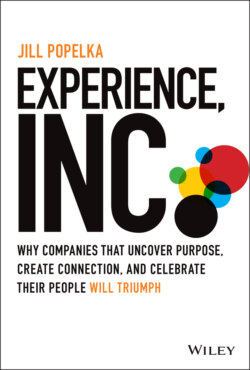Читать книгу Experience, Inc. - Jill Popelka - Страница 15
What Employees Want
ОглавлениеTo attract the best employees, you must provide a great employee experience. How do you achieve that?
Two in three U.S. employees say that the most important issue for CEOs to communicate is the company's values.1 Seven in ten employees say that leadership's stance on social issues influences whether they stay in their current job.2 Nearly three in four claim that their principal driver is “work that has purpose and meaning.”3 And nine in ten executives believe that an organization with shared purpose will enjoy employee satisfaction.4 The demand for meaningful, purposeful work has never been stronger than it is today.
Is compensation suddenly not important? Of course it is – though in one survey, the portion of workers who say that pay is most important is only 19 percent.5 There will inevitably be significant differences in how much people say they are motivated by money; salespeople will answer differently from social workers. Compensation is a huge influence on our willingness to accept and remain in a job, even if it is not that important to us in the day-to-day work. What's more, the issue of money can be a huge de-motivator for anyone who feels they are being paid unfairly.
It's not just about purpose and meaning, though. Opportunities for learning and a breadth of career development in a professional job are among the top reasons given for remaining with a company.6 In fact, one study found that 94 percent of employees say they would stay at a company longer if they had learning opportunities.7 Three-quarters of employees say they are more motivated to improve their technical and professional skills as a result of the pandemic.8
Our fundamental psychology has not changed all that much. What made our grandparents happy at work is the same for us: achieving meaningful things in an organization where we are appreciated, valued, and feel a sense of belonging. What has changed is the environment we live in. What has changed is our ability to get the things that make us happy at work.
And a lot of people out there are not happy.
A staggering number of people are quitting their jobs without immediately looking for the next one – a phenomenon in the United States and elsewhere that's been dubbed (in the U.S., anyway) “The Great Resignation,” creating an unpredictable labor market. “I don't want to make the same mistakes, where I just take anything, because I could end up in an even worse situation,” says Kara,* formerly a project manager at a software company, voicing a common concern. “Now that I have an idea of what's out there, I don't want to jump into a brand-new role just yet.” Companies are worried about recruitment and retention, about compensation and perks, and whether their efforts will succeed in this new landscape. Working conditions at a given company, bad or good, are public knowledge. “Amazon built cutting-edge package processing facilities to cater to shoppers' appetite for fast delivery, far outpacing competitors,” reports The New York Times. “But the business did not devote enough resources and attention to how it served employees, according to many longtime workers.”9
Burnout, a key indicator for quitting, is rampant. Among tech workers, 58 percent report experiencing it.10 Lots of employees – and former employees – are prioritizing that ever-elusive “work-life balance.”
Companies are starting to address employee experience, but it's not easy given that they're already dealing with the challenge of the hybrid workplace. What are the new working policies? What do employees really need? How do leaders meet those individual wants and expectations if they oversee a company of 100,000? Or even just 100? Business leaders and CHROs alike face a challenge.
“I know they want to create a better experience,” says Rachel, a copywriter and brand developer, about the mid-sized design firm she left for a better opportunity, “but I don't think they really know how.”
